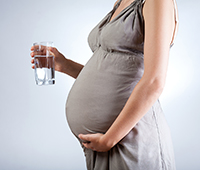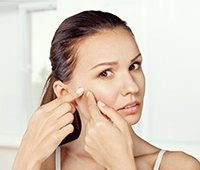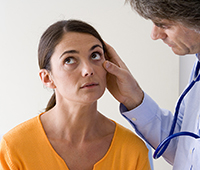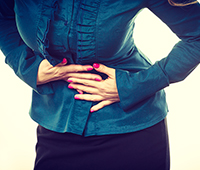WHAT IS Breastfeeding problems
- Definition
- Causes
- Symptoms
- Diagnosis
- Ayurvedic Tips
- FAQS
- References
Definition
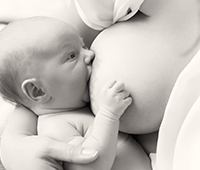
The breasts begin their work once the labour/delivery pains have begun. The hormone prolactin is responsible for the secretion of the milk. The first milk of the mother is called colostrum. It comes as yellow to orange in color and thick and sticky in texture. It is easy to digest and best for the baby. Colostrum has a laxative effect on the baby that helps him pass his stools, which goes on to help in the removal of excess bilirubin (a yellow pigment in blood & stool) and helps prevent jaundice. This type of pre milk substance flows for about 2-4 days before the letdown of the actual milk.1
According to Ayurveda, the mother’s breast being located in the Anahata chakra (heart center) of the body signifies that breasts are supposed to provide love and nurturing nourishment to the baby. Breast milk is called amrita, nectar, for the growing child. It is the essence (upadhatu) of the rasa dhatu (plasma - nutrients of blood).1
Disclaimer: The information on this page is not intended to be a substitute for professional medical advice. Do not use this information to diagnose or ayurvedic treatment of womens-health and/or breastfeeding problems without consulting the doctor. Consult your physician before beginning an exercise regime. "While we have products /ayurvedic medicines for womens-health and/or breastfeeding problems, you must consult an authorized physician before taking any of the products. For more information on products, visit www.dabur.com or call 1800-103-1644"
Causes
Causes OF Breastfeeding problems
Common problems related to breastfeeding include –
- Breast engorgement: This occurs when the breast is not fully emptied. It can be painful.
- Nipple pain/trauma: At the beginning of breastfeeding, most women feel a mild pain or discomfort, and this may be considered to be normal. For some women however nipples may get injured. The most common cause of pain during breastfeeding is due to nipple trauma caused by incorrect feeding position and inappropriate latch-on of the baby.
- Infections of the nipple or of the breast leading to mastitis: Mastitis and infection of the breasts may leading to sore nipples and breast boils (abscesses) that can be very painful requiring immediate treatment. Breastfeeding may have to be stopped temporarily during infections
- Poor milk production or hypogalactia: Prolactin is secreted at the end of delivery and signals to begin milk secretion. Brain secretes a hormone called oxytocin that controls the milk secretion process. This hormone action lasts for 3 to 4 days after delivery. After this the process depends on emptying of the breast. Therefore, the quality and quantity of suction by the infant now regulates the synthesis of maternal milk. Most women can produce enough milk to meet their infants demand. When milk is not sufficient, the infant does not feel satisfied after feedings, cries a lot, wants to nurse frequently, takes very long feedings and does not gain weight properly (< 20 g a day). The number of wet diapers a day (less than six to eight) and infrequent bowel movements, with a small amount of stools, which are dry and hard, indirectly indicate low intake of milk.
Disclaimer: The information on this page is not intended to be a substitute for professional medical advice. Do not use this information to diagnose or ayurvedic treatment of womens-health and/or breastfeeding problems without consulting the doctor. Consult your physician before beginning an exercise regime. "While we have products /ayurvedic medicines for womens-health and/or breastfeeding problems, you must consult an authorized physician before taking any of the products. For more information on products, visit www.dabur.com or call 1800-103-1644"
Symptoms
Symptoms OF Breastfeeding problems
- incomplete evacuation/ removal of milk from breast/heavy breast
- Painful breast
- Boil on breast
- Sore nipples/nipple injury
- Not sufficient milk for the baby/low weight gain in the baby
- Short or long session of breastfeeding
Disclaimer: The information on this page is not intended to be a substitute for professional medical advice. Do not use this information to diagnose or ayurvedic treatment of womens-health and/or breastfeeding problems without consulting the doctor. Consult your physician before beginning an exercise regime. "While we have products /ayurvedic medicines for womens-health and/or breastfeeding problems, you must consult an authorized physician before taking any of the products. For more information on products, visit www.dabur.com or call 1800-103-1644"
Diagnosis
Diagnosis OF Breastfeeding problems
Disclaimer: The information on this page is not intended to be a substitute for professional medical advice. Do not use this information to diagnose or ayurvedic treatment of womens-health and/or breastfeeding problems without consulting the doctor. Consult your physician before beginning an exercise regime. "While we have products /ayurvedic medicines for womens-health and/or breastfeeding problems, you must consult an authorized physician before taking any of the products. For more information on products, visit www.dabur.com or call 1800-103-1644"
Ayurvedic Tips
Ayurvedic Tips Breastfeeding problems
Diet Recommendations (Aahar)
Treatment of Stanyanasa (cessation of breast milk) and Stanyakshya (loss of milk) is outlined in ayurveda with dietary changes including cereals, meat, cow’s milk, sugar, curd etc. are advised.4
For all breast feeding women nutrition tips include4-
- Have healthy, balanced, and nourishing food
- Do not eat leftovers, packaged, canned, and frozen food
- Prefer freshly made dal, soups, whole grains and vegetables
- Eat food according to your body type or dosha. This will regulate the digestive fire.
- Have plenty of warm water to flush toxins out of the body
- Nutrient-rich choices of foods include whole-grains, fruits, vegetables, dairy, proteins and fats.
- Protein rich foods include lean meat, eggs, dairy, beans, lentils etc.
- Adequate amount of clear fluids are needed to produce enough milk. Sugary drinks, alcohol and other caffeinated beverages should be avoided.
Lifestyle changes (Vihar)
- Happiness, absence of sorrow, anger, fear, and avoidance of excessive walking is recommended for better breast feeding and increased breast milk.
- Regular healthy exercise and keeping fit helps in good breastfeeding practices.
Disclaimer: The information on this page is not intended to be a substitute for professional medical advice. Do not use this information to diagnose or ayurvedic treatment of womens-health and/or breastfeeding problems without consulting the doctor. Consult your physician before beginning an exercise regime. "While we have products /ayurvedic medicines for womens-health and/or breastfeeding problems, you must consult an authorized physician before taking any of the products. For more information on products, visit www.dabur.com or call 1800-103-1644"
FAQS
FAQS
1. I am 3 month’s pregnant, what diet I should take according to Ayurveda?
Ayurveda recommends right dietary and lifestyle changes along with herbs to promote a healthy pregnancy.
Dietary advice includes –
- Eating a healthy balanced diet, lots of fruits, vegetables and adequate diary foods
- Including whole grains and complex carbohydrates rather than processed foods
- Routine use of folic acid supplements daily. Foods rich in folic acid include lentils, kidney beans, green leafy vegetables, citrus fruits, nuts, and beans.
- Food should be enriched with all six types of tastes (sweet, pungent, sour, bitter, spicy and astringent)
- Female with prior history of abortion should avoid brinjal, suran, papaya, celery, onion, chili, garlic, ginger, pepper, mustard, jaggery in diet
- Those who suffer from constipation, gas, bloating must avoid peas, potato and other heavy to digest cereals. They can take green grams.
During the first trimester Ayurveda emphasizes on nourishing rasa and rakta dhatu, that is blood and blood plasma. This means diet should be rich in juicy fruits, coconut water, herbal infusions (raspberry leaf, nettle, oatstraw). Milk and ghee should be included in diet.
2. What care do I take for first three months of pregnancy?
According to Ayurveda following lifestyle changes to be made:
- Include regular exercise and keep fit.
- Avoid abnormal asanas (positions), avoid sexual intercourse, straining at abdomen, heavy exercise and weight loss programsn
- Avoid travelling in a vehicle on rough roads, sitting for long hours, lifting heavy objects
- Avoid negative feelings and thoughts such as sorrow, anger, grief, fear and doubt as these things will affect mental and physical growth of fetus
- Avoid exposure to unhappy or violent events
- Avoid sleeping during the day and staying up late in night
- Do not hold natural urges like holding urine or motion
3. What can I expect during my 2nd trimester?
The mother’s body changes significantly during second trimester. The discomforting symptoms of the first trimester like morning sickness, fatigue, bloating etc are typically lower during this time. It is sometimes the easiest of the three trimesters of pregnancy. During this time the baby grows rapidly. Some of the maternal changes include
- Larger breasts. Breast tenderness that was present during the first trimester may be reduced in intensity.
- Growing uterus leads to a growing belly
- Starting in the second trimester, there may be a weight gain of about 1.4 to 1.8 kilograms a month until delivery.
- There may be slight contractions of the uterus wall as it builds strength.
- Dark patches may appear over the skin. There may be a dark line down the abdomen
- Stretch marks may also become apparent
- Nasal and gum problems may appear.
- Spells of dizziness are common
- Leg cramps especially in the calf muscles can occur more frequently.
- Some vaginal discharge is seen
- Enlarging uterus may press upon the bladder. Bladder and urinary infections are common.
4. What diet should I take post-delivery?
Ayurveda suggests following diet recommendation post-delivery:
- Increase intake of foods that include sesame seeds, dry nuts, fenugreek seeds/leaves, garlic, drumsticks & carom seeds to increase milk supply for breastfeeding.
- Have fresh milk as the first meal of the day to help may help enhance the quality of the breastfeeding milk.
- Consume and cook vegetables such as beans, squash, carrots, beets, green leafy vegetables and zucchini preferably in ghee.
- Lentils, cereals and whole grains should be seasoned with whole spices and served hot.
- Avoid cabbage, potatoes and cauliflower during the first three weeks.
- Avoid leftover foods, stale and cold foods.
5. I am 4 months pregnant and suffer from acidity. What can I do to avoid acidity?
Ayurveda suggests simple diet changes to prevent acidity. Few of them are:
- Avoid excess greasy or spicy foods
- Irregular eating habits to be avoided
- Include more leafy vegetables and Adequate water intake
- Avoid sleeping just after taking meal.
- Excessive intake of the caffeine to be avoided. Carbonated drinks are to be avoided
- The diet should consist of milk with sugar, and a little old rice.
- Other recommended substances are: barley, wheat, rice (at least one year old), cucumber, bitter gourd, green banana, pumpkin, pomegranate, and cow's milk.
- Pomegranate juice andpomegranate chutney also help balance the acid in the stomach. It tastes sour, but it is actually both astringent and bitter, which help balance Pitta.
- Eating small meals more often helps in digestion
6. I am pregnant and get often constipated. What can I do?
Ayurveda and general medicine recommend a dietary plan for pregnant women with constipation. This includes –
- Plenty of fluids in diet
- Adequate amounts of fruits and vegetables
- Vata and Pitta pacifying diets including warm soupy foods
- Lightly cooked seasonal vegetables and stewed fruits
- Inclusion of ghee in diet and large glass of warm water with each meal
Lifestyle suggestions:
- Light massage with warm sesame oil
- Regular physical activity can help reduce pregnancy constipation
- Quitting smoking and alcohol
- Cutting down on caffeine containing drinks
- Taking regular and frequent meals
7. What is dysmenorrhea?
Dysmenorrhoea refers to painful menstruation that is periods with menstrual cramps. These pains are typically throbbing or cramping pains in the lower abdomen. These pains are usually apparent just before and during the menstrual periods in most women who suffer from dysmenorrhea. The pain may range from annoying or a discomfort to severe so that it may be difficult to do you daily routine for few days every month. In some women, the cause of dysmenorrhea may be endometriosis or uterine fibroids while in young girls ovulatory cycles, pin hole and other psychological factors may cause the condition.
In Ayurvedic classics, menstrual pain which is so severe that you cannot do daily activities is termed as dysmenorrhea (Kashtartava). According to Ayurvedic text there are many other diseases in which Kashtartava is considered and is described as a symptom. According to Ayurveda, aggravation of vata and pitta dosha are the main causes of menstrual diseases.
8. I have endometriosis. Can I exercise during menstruation?
For women with endometriosis, regular rest is important. Women should avoid exercise during menstruation and should keep their exercise relatively moderate throughout the month. In general also, strenuous physical activity, prolonged standing etc may be avoided during periods.
Forms of exercise that regulate the flow of Vata and nourish the nervous system such as walking, swimming, Tai chi, Qigong and some forms of yoga are advisable.
Regularity in daily routine (going to bed and waking up at a similar time each day and regular meal times) is very important for calming aggravated Vata, as is regular self-abhyanga / warm oil massage.
9. I am not able to conceive since last two years. What could be the reason?
According to Ayurveda, Vandhyatva or Female infertility is a disease of the reproductive system involves the failure to achieve a pregnancy or a live offspring. Infertility exists when a healthy couple is unable to achieve pregnancy after two or more years or fail to conceive for several years after the first delivery.
The causes of infertility may lie in the male partner or in the female partner. Possible causes of male infertility include –
- Hormonal imbalances
- Altered quality of sperm that may be low in number or may be unhealthy
- Blockage of the tube that carries the sperm to the penis from the testes
- Impotence or erectile dysfunction
The causes of female infertility include –
- Hormonal imbalances
- Damage to the fallopian tubes or diseases of the ovaries or womb
- Fibroids or endometriosis affecting the uterus
Some general causes of infertility include:-
- Early and Late marriage: Not well development of reproductive organs.
- Nutrition less & fat rich food: No nourishment of body, tempers ovary function.
- Tight clothing & mobile: Overheating of testis leads to low sperm count.
- Smoking & alcoholism: Lowers motility of sperms and lowers LH hormones.
- Improper hygiene of genital organs: Causes infection of genital tract.
- Stress: Loss of energy and enthusiasm to do sex.
- Loss of libido. Affects HPO axis leads to impairment of ovarian function. e to above causes disord
Long term diseases, psychological or environmental factors may cause infertility in both men and women. With age fertility usually declines.
10. Is menopause a disease?
Menopause is a natural physiological state. It is defined as occurring 12 months after a woman’s last menstrual period and marks the end of menstrual cycles. Menopause can happen in the 40s or 50s. It is a natural biological process that ends the fertility. However it is no reason not to stay healthy and vital.
Ayurveda describes menopause as a normal stage of life that comes with aging. ‘Vata’ increased during the later years of life. Hence symptoms of menopause experienced by some women are similar to the symptoms seen when the Vata dosha rises and upsets the normal balance of the body. Vata-type menopausal symptoms are depression, anxiety, and insomnia (not able to sleep properly). There can be involvement of more than one dosha in menopause. Women with Pitta-type symptoms are often angry and suffer hot flashes. Kapha type symptoms include low mood, weight gain, and feelings of mental and physical heaviness.
Disclaimer: The information on this page is not intended to be a substitute for professional medical advice. Do not use this information to diagnose or ayurvedic treatment of womens-health and/or breastfeeding problems without consulting the doctor. Consult your physician before beginning an exercise regime. "While we have products /ayurvedic medicines for womens-health and/or breastfeeding problems, you must consult an authorized physician before taking any of the products. For more information on products, visit www.dabur.com or call 1800-103-1644"
References
References
- Skanduna J. Healthy breast milk. Accessed on 2nd September, downloaded from: http://www.ayurvedacollege.com/articles/students/Breast-Milk
- Giugliani ERJ. Common problemsduring lactation and their management. J Pediatr 2004; 80(5 Suppl):S147-S154
- Singh K et al. Breast Feeding- An Ayurveda Perceptive. J Homeop Ayurv Med 2012, 1:4
Disclaimer: The information on this page is not intended to be a substitute for professional medical advice. Do not use this information to diagnose or ayurvedic treatment of womens-health and/or breastfeeding problems without consulting the doctor. Consult your physician before beginning an exercise regime. "While we have products /ayurvedic medicines for womens-health and/or breastfeeding problems, you must consult an authorized physician before taking any of the products. For more information on products, visit www.dabur.com or call 1800-103-1644"
Know more on Women's Health
